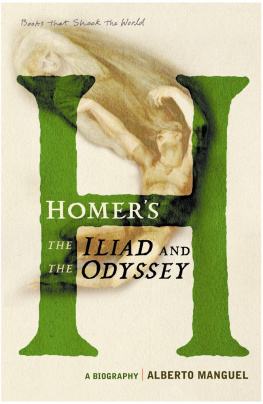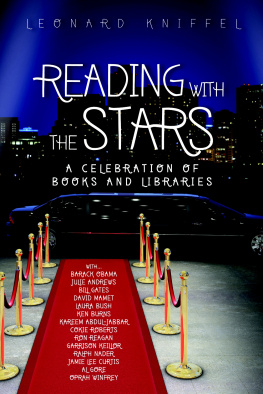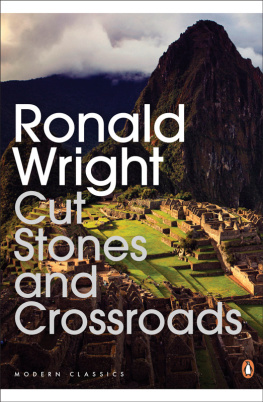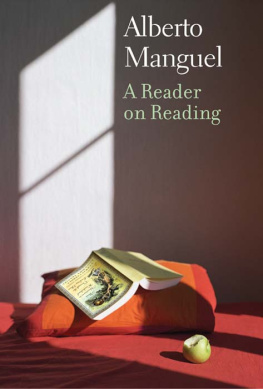Packing My Library
Alberto Manguel
PACKING MY LIBRARY
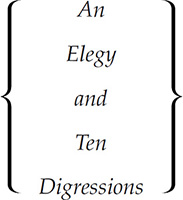

Copyright 2018 by Alberto Manguel, c/o Schavelzon Graham Agencia Literaria, S.L. www.schavelzongraham.com. All rights reserved. This book may not be reproduced, in whole or in part, including illustrations, in any form (beyond that copying permitted by Sections 107 and 108 of the U.S. Copyright Law and except by reviewers for the public press), without written permission from the publishers.
Yale University Press books may be purchased in quantity for educational, business, or promotional use. For information, please e-mail (U.S. office) or sales@yaleup.co.uk (U.K. office).
Designed by Nancy Ovedovitz and set in Palatino and Weiss Bold types by Integrated Publishing Solutions.
Printed in the United States of America.
Library of Congress Control Number: 2017950992
ISBN 978-0-300-21933-3 (hardcover : alk. paper)
A catalogue record for this book is available from the British Library.
This paper meets the requirements of ansi/niso Z39.48-1992 (Permanence of Paper).
10 9 8 7 6 5 4 3 2 1
For Craig
A man would have no pleasure in
discovering all the beauties of the
universe, even in heaven itself, unless
he had a partner with whom he
might share his joys.
Cicero, De amicitia, 88
Packing My Library
MY LAST LIBRARY WAS IN FRANCE, HOUSED IN AN old stone presbytery south of the Loire Valley, in a quiet village of fewer than ten houses. My partner and I chose the place because next to the house itself was a barn, partly torn down centuries ago, large enough to accommodate my library, which by then had grown to thirty-five thousand books. I thought that once the books found their place, I would find mine. I was to be proved wrong.
I knew I wanted to live in this house the first time I opened the heavy oak carriage doors that led across the entrance into the garden. The view, framed by the arched stone portal, was of two ancient Sophora trees casting shadows over a soft lawn that stretched all the way to a distant gray wall; we were told that underground, vaulted corridors had been dug out during the peasant wars to connect the house with a now crumbling tower in the distance. Over the years, my partner cared for the garden, planted rosebushes and a vegetable plot, and tended to the trees, which had been savagely treated by the previous owners, who had filled one of the hollow trunks with garbage and allowed the top branches to become dangerously fragile. Every time we walked through the garden we spoke of being its guardians, never its owners, because (as with all gardens) the place felt possessed by an independent spirit which the ancients called numinous. Pliny, explaining the numinosity of gardens, says that this is because at one time trees were the temples of the gods, and the gods had not forgotten. The fruit trees in the back corner of the garden had grown over an abandoned cemetery dating back to the ninth century; perhaps here too the ancient gods felt at home.
The walled garden was an extraordinarily quiet place. Every morning at about six, I would come downstairs, still half-asleep, make myself a pot of tea in the dark rafted kitchen, and sit with our dog on the stone bench outside to watch the morning light creep along the back wall. Then I would go with her into my tower, which was attached to the barn, and read. Only the song of birds (and in summer, the drone of honeybees) broke the silence. In the evening twilight, tiny bats flew around in circles, and at dawn the owls in the church steeple (we never understood why they chose to build their nest under the tolling bells) swooped down to catch their supper. They were barn owls, but on New Years Eve a huge white owl, like the angel that Dante describes steering the ship of souls to the shores of Purgatory, would glide noiselessly across the dark.
The ancient barn, whose stones carried the signature of their fifteenth-century masons, housed my books for almost fifteen years. Under a ceiling of weathered beams, I gathered the survivors of many previous libraries from my childhood on. I had only a few books that a serious bibliophile would have found worthy: an illuminated Bible from a thirteenth-century German scriptorium (a gift from the novelist Yehuda Elberg), an Inquisitors manual from the sixteenth century, a number of contemporary artists books, quite a few rare first editions, and many signed copies. But I lacked (still lack today) the funds or the knowledge to become a professional collector. In my library, shiny young Penguins sat happily side by side with severe-looking leather-bound patriarchs. The books most valuable to me were private association copies, such as one of the earliest books I read, a 1930s edition of Grimms Fairy Tales printed in somber Gothic type. Many years later, memories of my childhood drifted back whenever I turned the yellowed pages.
I set up my library according to my own requirements and prejudices. Unlike a public library, mine demanded no common codes that other readers could understand and share. A certain zany logic governed its geography. Its major sections were determined by the language in which the books were written: that is to say, without distinction of genre, all books written originally in Spanish or French, English or Arabic (the latter a language which I cant speak or read) sat together on a shelf. I allowed myself, however, many exceptions. Certain subjectsthe history of the book, biblical commentaries, the legend of Faust, Renaissance literature and philosophy, gay studies, medieval bestiarieshad separate sections. Certain authors and certain genres were privileged: I collected thousands of detective novels but very few spy stories, more Plato than Aristotle, the complete works of Zola and hardly any Maupassant, all of John Hawkes and Cynthia Ozick but barely any of the authors on the New York Times best-seller list. I had on the shelves dozens of very bad books which I didnt throw away in case I ever needed an example of a book I thought was bad. Balzac, in Cousin Pons, offered a justification for this obsessive behavior: An obsession is a pleasure that has attained the status of an idea.
Though I knew that we were only the keepers of the garden and the house, the books themselves, I felt, belonged to me, were part of who I was. We speak of certain people who are reluctant to lend an ear or a hand; I seldom lent a book. If I wanted someone to read a certain volume, Id buy a copy and offer it as a gift. I believe that to lend a book is an incitement to theft. The public library of one of my schools carried a warning both exclusionary and generous: THESE ARE NOT YOUR BOOKS: THEY BELONG TO EVERYONE. No such sign could be put up in my library. My library was to me an utterly private space that both enclosed and mirrored me.
When I was a child in Israel, where my father was the Argentine ambassador, I was often taken to play in a park that started off as a well-kept garden and faded into sandy dunes. Huge tortoises plodded their way across it, leaving dainty tracks in the sand. Once I found a tortoise whose shell had been half torn off. It seemed to stare at me with its ancient eyes, as it dragged itself over the dunes towards the sea beyond, bereft of something that had protected and defined it.
Ive often felt that my library explained who I was, gave me a shifting self that transformed itself constantly throughout the years. And yet, in spite of this, my relationship to libraries has always been an odd one. I love the space of a library. I love the public buildings that stand like emblems of the identity a society chooses for itself, imposing or unobtrusive, intimidating or familiar. I love the endless rows of books whose titles I try to make out in their vertical script that has to be read (Ive never discovered why) from top to bottom in English and Italian, and from bottom to top in German and Spanish. I love the muffled sounds, the pensive silence, the hushed glow of the lamps (especially if they are made of green glass), the desks polished by the elbows of generations of readers, the smell of dust and paper and leather, or the newer ones of plasticized desktops and caramel-scented cleaning products. I love the all-seeing eye of the information desk and the sibylline solicitude of the librarians. I love the catalogues, especially the old card drawers (wherever they survive) with their typed or scribbled offerings. When Im in a library, any library, I have the sense of being translated into a purely verbal dimension by a conjuring trick Ive never quite understood. I know that my full, true story is there, somewhere on the shelves, and all I need is time and the chance to find it. I never do. My story remains elusive because it is never the definitive story.
Next page

